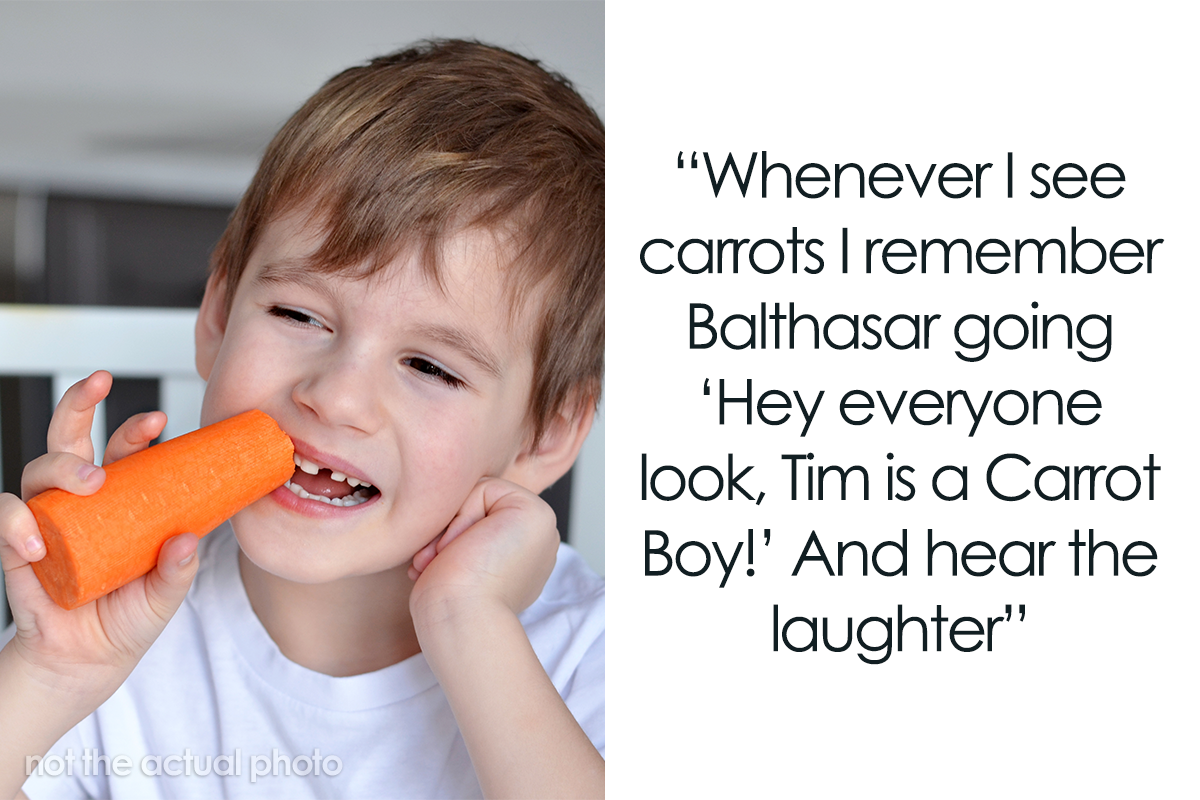
Person Shares How They Held A Grudge Against A Bully For Calling Them “Carrot Boy” Only To Embarrass Themself 29 Years Later At A Class Reunion
InterviewRecently, a man shared an incident he had at a high school reunion that left him utterly embarrassed.
In a story posted on the TIFU community on Reddit, the person who goes by Carrot_man_tifu recounted a moment from when he was in third grade 29 years ago.
“I took one of the carrot packs out of my lunch box, the kind that came with a little cup of ranch dressing. All of the sudden this kid Balthasar said ‘Hey everyone, look, Tim is a Carrot Boy!’ Everyone at the whole lunch table started to laugh. I couldn’t believe it.”
It turns out this incident struck the author deeper than he could have imagined. While in adulthood, the author has kept recounting this memory as something that was a “big disrespectful insult to me.”
Now, the school reunion arrives and the author decides to show up, but the party is about to take an unplanned turn.
A man who has been holding a grudge over an incident from the third grade has a meltdown at a high school reunion
Image credits: nata_llo (not the actual photo)
Image credits: westend61 (not the actual photo)
Image credits: altanaka (not the actual photo)
Image credits: carrot_man_tifu
Bored Panda reached out to Susan DeCou, a certified stress management coach with over 30 years of experience coaching others in the corporate world as a trainer, coach, manager, and mentor – helping others become the best they can possibly be, to find out an expert’s opinion about this story.
“I think most of us can relate to Tim to some degree. While we might not have such an extreme reaction, it’s easy to continue to feel traumatized by things that happened to us as kids. So, why is that?” Susan explained that we often forget, as adults, that children don’t have the knowledge and life experience that adults have. “Things that kids don’t understand can be frightening or overwhelming, even if the adults around them don’t think so.”
When it comes to this particular story, Susan argues that Tim was caught off guard by Balthazar. “He didn’t have the social expertise or the wisdom to know that Balthazar’s comments were teasing, silly, and not important in the great scheme of things.” Susan assured us that there certainly isn’t anything “wrong” with eating carrots. “But at 8, that kind of teasing is monumental! ‘He made fun of me in front of everyone! The world is going to end!'”
Moreover, we also don’t have the self-confidence as children that we have as adults, Susan argues. “Tim’s ego got bruised by the carrot comments. Balthazar’s teasing sent the message that Tim was different. When you’re 8 years old, the last thing you want to be is different from everyone else! ‘Is there something wrong with me? Why do the other kids think it’s weird to eat carrots? Am I different from everyone else?,'” the life coach commented.
Susan said that the fact that Tim took it so very personally and held onto it for that many years hints at something deeper, maybe a lack of self-esteem. “Balthazar probably didn’t start it, but he sure added to it. Some folks see each and every little thing that happens as a reinforcement of a larger, more upsetting belief.”
Susan recounted a case: “For example, I know a woman who, as a little girl, felt ignored by her mother, who was dealing with health issues. When she went to kindergarten, one of the other children said, ‘Why would I want to play with you?’ The hurt from that comment followed her into adulthood. Her mother didn’t want to play with her. The other kids didn’t want to play with her. She must not be good enough.”
“That message followed her through the years, and she allowed every mistake and every little slight she experienced to reinforce the ‘I’m not good enough’ message. She spent years healing from those feelings of inadequacy. It wasn’t the classmate’s comment that caused the issue, but the memory of it lingered on and reinforced her negative self-belief.”
Similarly, Susan argues, “for Tim, seeing Balthazar reignited the neural pathways in his brain that those negative emotions follow. They must be intense emotions for him to react the way he did!”
The life coach explained that when we experience that kind of intense emotion over something that is seemingly trivial, a good way to deal with it is to ask: “‘Why is this bothering me so much?’ Identify and label the emotion. Are you experiencing anger? Fear? Regret? Shame? Then ask yourself, ‘What about this situation is causing me to feel that way?’ It’s like peeling an onion – you get through layer after layer until you reach the core. Understanding why things bother you is the beginning of healing from it,” Susan concluded.
And this is how people reacted to this whole story
I was really thinking that the story would be: 1) got called Carrot Boy, followed by 2) everyone called me Carrot Boy for years to come. But there was no #2. If that is the worst bullying this guy endured, I'm jealous.
It's disappointing how many comments have trivialized this event. The kid Balthasar received validation for humiliating the OP over something as random as eating a carrot stick, and the OP bore the weight of that humiliation well into his adult life before further embarrassing himself by blowing up at the HS reunion. If a single isolated remark can affect a child this deeply, imagine the broken heart of the outcast child who's bullied and humiliated by other kids every day of his life while his "responsible" adult supervisors look the other way.
Proximity to an event makes it feel important to you. A small slight can stick with you and be magnifed in your memory 'beacuse it was strongly felt by you it must be important to those around you'. When it's your proximity and the strength of feeling you gave it. An important learning experience in understanding our selfworth and how a small act can affect and even define a person.
I was really thinking that the story would be: 1) got called Carrot Boy, followed by 2) everyone called me Carrot Boy for years to come. But there was no #2. If that is the worst bullying this guy endured, I'm jealous.
It's disappointing how many comments have trivialized this event. The kid Balthasar received validation for humiliating the OP over something as random as eating a carrot stick, and the OP bore the weight of that humiliation well into his adult life before further embarrassing himself by blowing up at the HS reunion. If a single isolated remark can affect a child this deeply, imagine the broken heart of the outcast child who's bullied and humiliated by other kids every day of his life while his "responsible" adult supervisors look the other way.
Proximity to an event makes it feel important to you. A small slight can stick with you and be magnifed in your memory 'beacuse it was strongly felt by you it must be important to those around you'. When it's your proximity and the strength of feeling you gave it. An important learning experience in understanding our selfworth and how a small act can affect and even define a person.

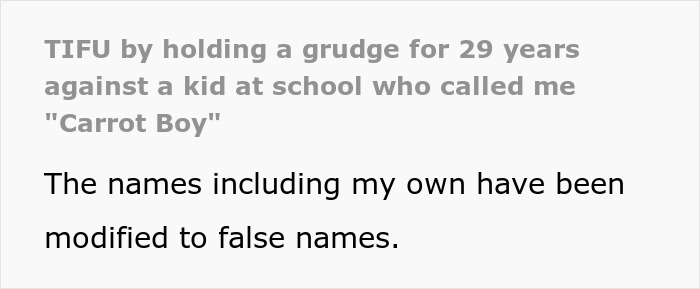
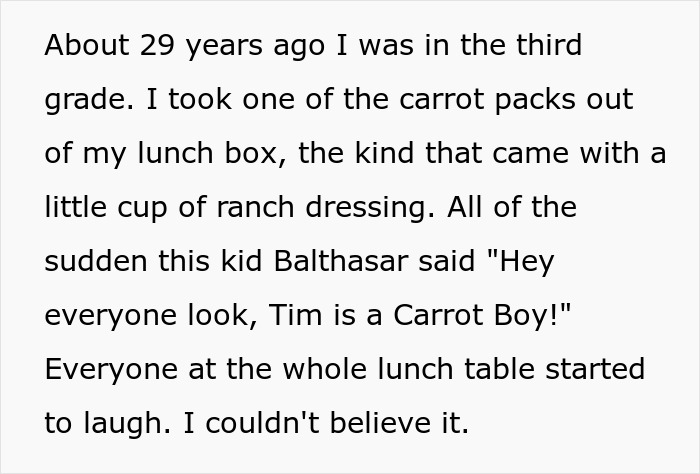

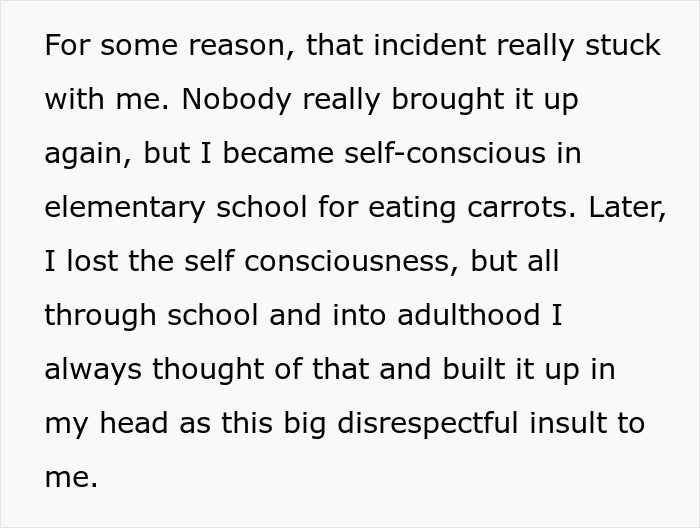
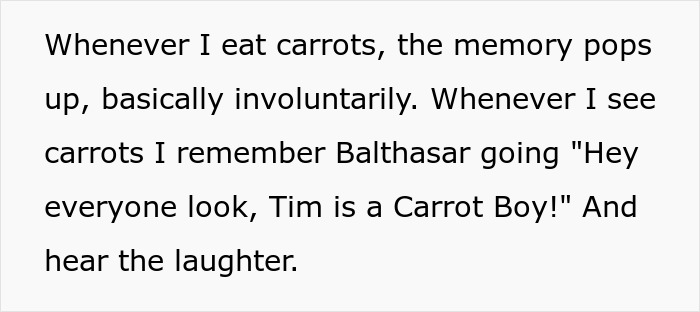
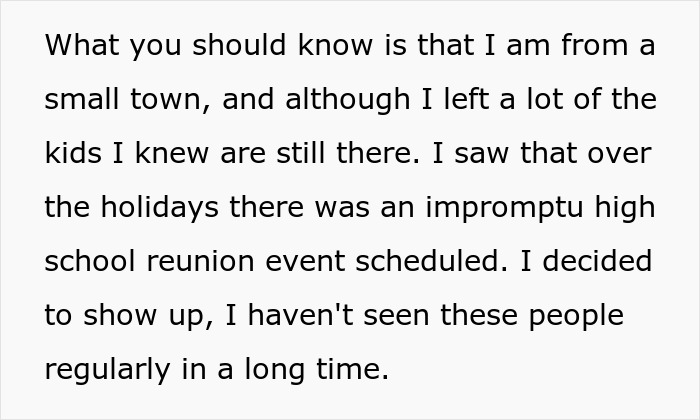
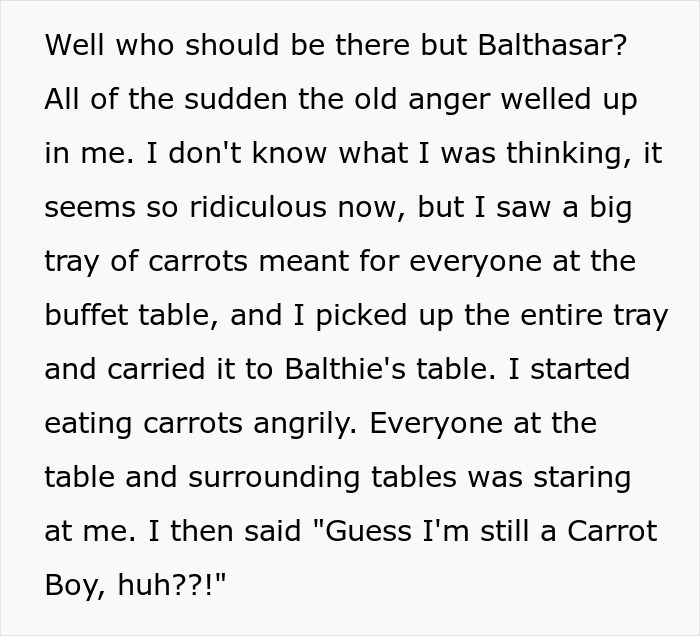
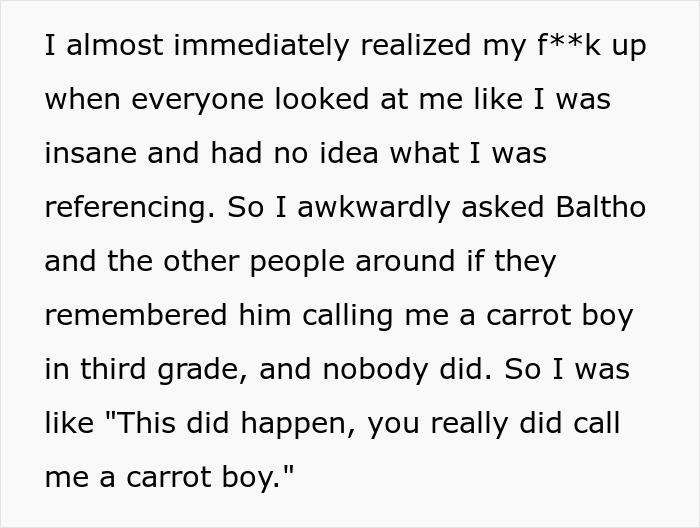
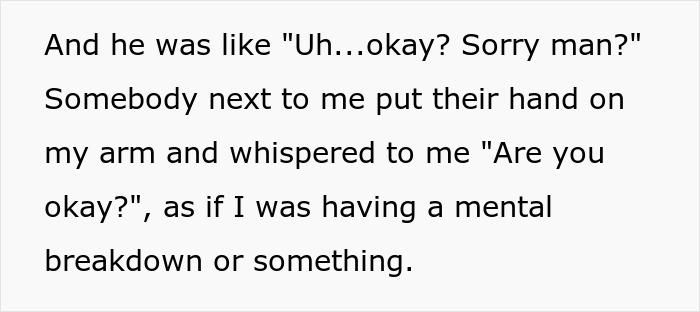
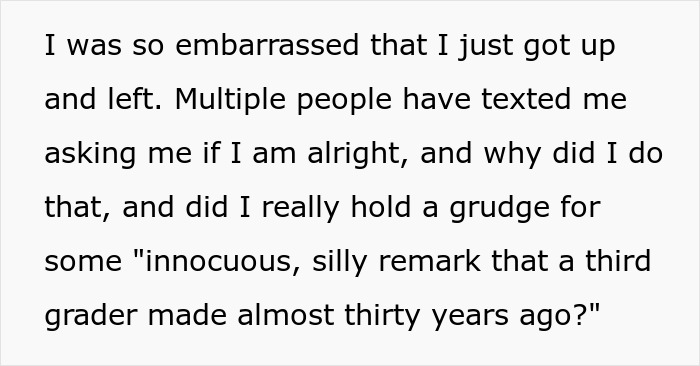

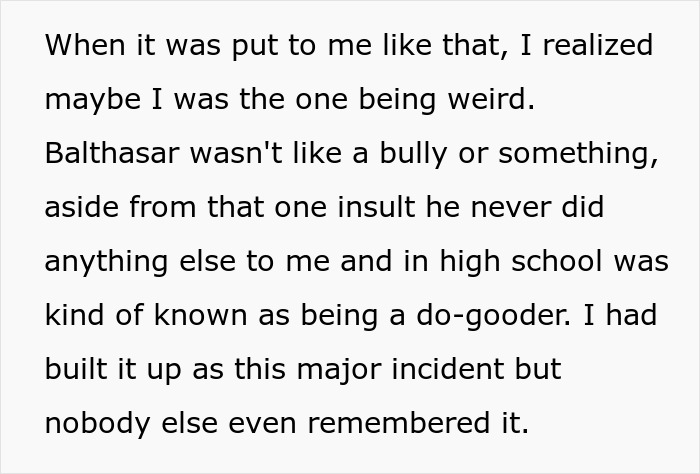
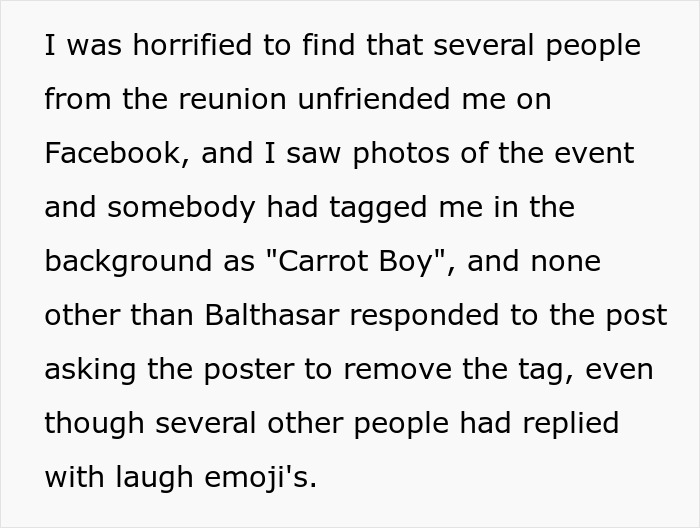









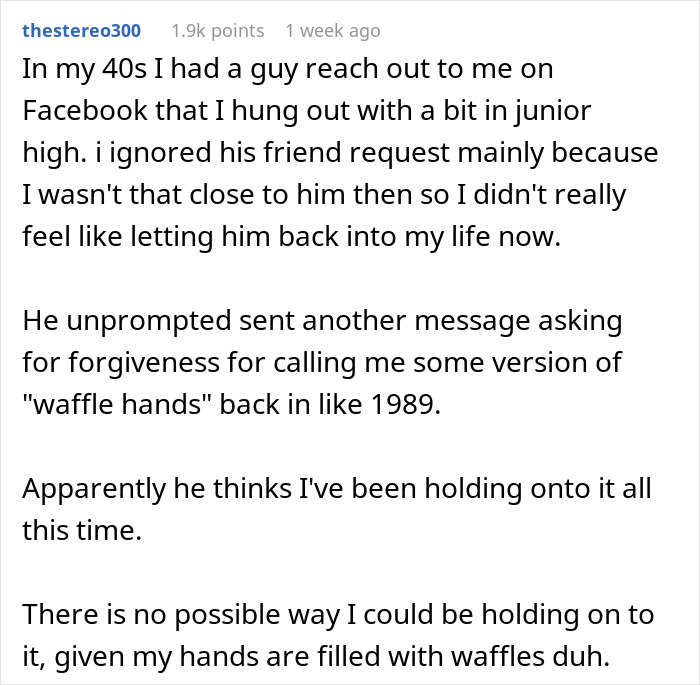


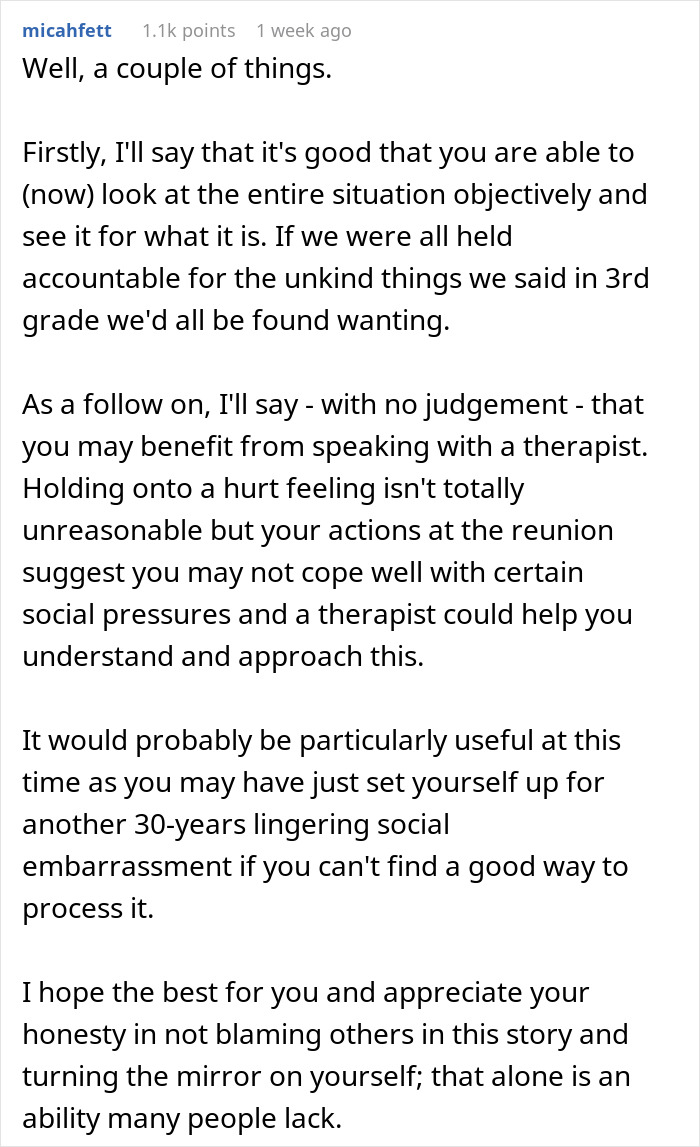






55
30